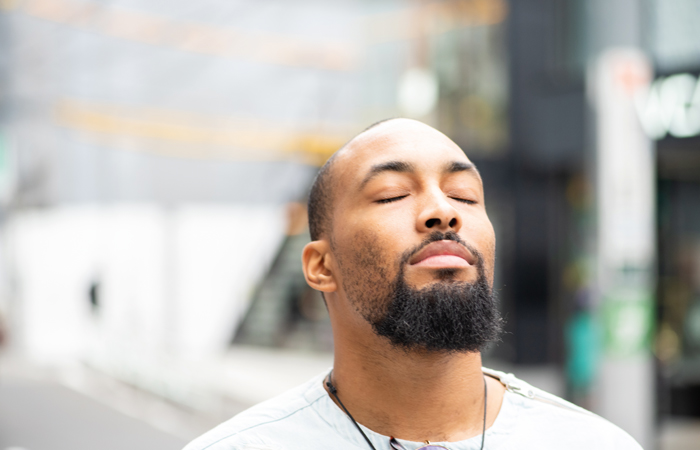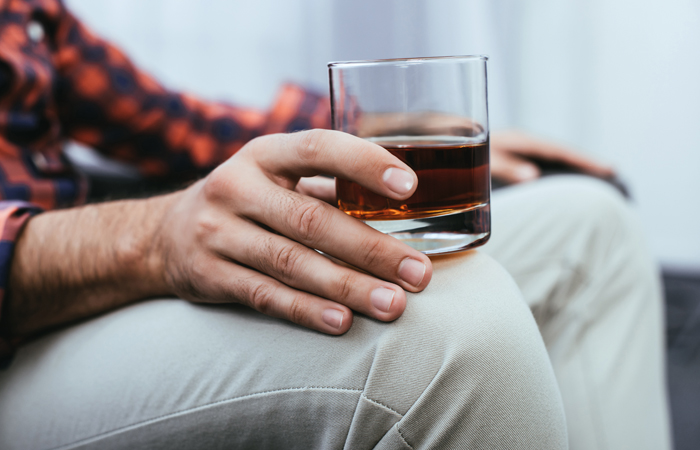Men's mental health
In Conditions
Follow this topic
Bookmark
Record learning outcomes
With men’s mental health declining over the last 10 years, and the Covid-19 pandemic not helping the situation. Find out what can pharmacy teams do to support men who are struggling
Men reportedly feel worried or low more regularly than 10 years ago, and they are consequently twice as likely to feel suicidal, according to a new report from the mental health charity Mind.

Entitled ‘Get It Off Your Chest: Men’s mental health 10 years on’, the report was commissioned by Mind as part of its charity partnership with the English Football League (EFL) and compares new polling data from YouGov with the same survey from 2009 to understand how the challenges facing men’s mental health have changed over the past decade.
The results paint a mixed picture, suggesting that while men generally feel more able to seek help and open up about their mental health than a decade ago, those with current worries are still, and in some cases increasingly, relying on unhealthy coping mechanisms such as drinking alcohol alone (13 per cent versus nine per cent) and using recreational drugs (four per cent versus one per cent). It also shows men are more likely than women to drink more alcohol (15 per cent compared to 10 per cent), smoke more (seven per cent verses six per cent) and take recreational drugs (two per cent compared to one per cent).
42 per cent of UK men said their mental health had been negatively affected by life in lockdown
Alcohol and the Covid-19 pandemic
Similar trends can be found in recent data from the Office for National Statistics (ONS), which shows that alcohol-related deaths in England and Wales increased for both genders in 2020 during the Covid-19 pandemic, with 5,460 deaths related to alcohol-specific causes registered in the first three quarters of 2020. Worryingly, rates of male alcohol-specific deaths were more than double those of females, with rates ranging between 17.3 and 17.8 deaths per 100,000 males in 2020 compared with between 8.0 and 8.6 deaths per 100,000 females.
Since March 2020, many men have been suffering from heightened anxiety, stress and loneliness, which can all lead to unhealthy coping mechanisms such as drinking alcohol to excess. The Men’s Health Forum says these figures are evidence of the need for “a gender-sensitive approach around alcohol, Covid-19 and public health and health policy in general”.
The organisation’s CEO Martin Tod added: “We know men are more likely than women to self-medicate with alcohol, so this increase in deaths during the Covid-19 pandemic demonstrates how important it is to tackle the mental health problems that can lead to the abuse of alcohol rather than just see the drinking problem itself.”
Mike Wakeman, clinical pharmacist and scientific advisor for Alive multivitamin and supplements, suggests that pharmacy teams are well placed to support men struggling with their mental health and associated issues with alcohol. “Drinking excessively is not a good way to manage difficult feelings,” he says. “Encourage men to stay within the recommended weekly alcohol limit of 14 units – equivalent to six pints of average-strength beer or 10 small glasses of low-strength wine – and try to have at least two alcohol-free days per week.”
In addition, Mike says it’s no surprise that Covid-19 has had a significant impact on men’s mental health. “A recent poll commissioned by the mental health charity Samaritans among 2,000 men aged 18-59 found that 42 per cent of UK men said their mental health had been negatively affected by life in lockdown, with the charity pointing to the lack of social connection as a contributing factor,” he explains. “And more than half the men surveyed (56 per cent) also said they are feeling worried or anxious as restrictions ease and the world goes back to ‘normal’.”

Addressing reticence
But it’s not all negative. Mind’s ’10 years on’ report does reveal that over the last decade some progress has been made, with men feeling more able to seek help and open up about their mental health. Mind says men are now almost three times more likely to see a therapist if they feel worried or low for two weeks or more than they were in 2009. Men’s willingness to seek support from their GP has also jumped significantly and they are now equally as willing as women to do this (both 35 per cent). This suggests that the stigma around seeking support for mental health issues is lessening, with awareness-raising campaigns, such Mind’s ‘Time to Change’, challenging stereotypes of the ‘strong and silent’ man.
This is good news, especially as Mike says research suggests that “men who can’t speak openly about their emotions may be less able to recognise symptoms of mental health problems in themselves and be less likely to reach out for support.”
Nonetheless, Vicki Ensor, senior policy advisor for Mind, says there is still more work to be done. “Many men feel like support services aren’t for them, or that seeking help might be seen as a sign of weakness,” she explains. “They may also just be unaware of how they can access help.”
Another problem is that the pandemic has seen many support services downscaled or put on hold, and while male friendships are often based on shared activity, such as going to the pub and attending or playing sports, none of these options have been fully open during the Covid-19 pandemic.
Pharmacy interventions
Bearing in mind these barriers to social and supportive contact, Mind’s report calls for more effort to be made by healthcare professionals to provide men with alternative suggestions for help and support locally. For instance, when asked to imagine they were seeing a GP about feeling anxious or low and didn’t want to be prescribed medication, the top alternatives that men would prefer were found to be face-to-face therapy (32 per cent), physical activity (15 per cent) or a social activity (14 per cent).
This fits with the NHS Long Term Plan in which NHS England has pledged that by 2023/24, a total of 900,000 more people will have access to ‘social prescribing’ – a golden opportunity for men to access alternatives to traditional clinical services that support mental health, such as physical exercise, walking groups, gardening groups or learning activities, on prescription.
Although it is unlikely that pharmacy support staff would directly be involved in formal social prescribing themselves, Mike says there are plenty of proven ways for pharmacy staff to help men to tackle mental health concerns, such as talking to them about exercise, diet and supplementation.
“Firstly, exercise releases chemicals in the brain that make us feel good and regular exercise can boost self-esteem, concentration, sleep and overall wellness,” says Mike. “Exercising doesn’t just mean doing sport or going to the gym: walks in the park or gardening can also help to keep active. Encourage men to do about 30 minutes exercise at least five days a week and make physical activity that they enjoy a part of their day.”
Mind has piloted a model for physical activity sessions through its ‘Get Set to Go’ programme, which supports people with mental health problems to get more active. Previous participants found that the programme increased their ability to take part in physical activity, but also improved their social support structures and self-esteem.
Diet is another important consideration, and Mike says there are links between what people eat and how they feel, particularly when it comes to increasing intake of vitamins and minerals and limiting high-caffeine or sugary food and drinks. “The brain needs a mix of nutrients to stay healthy and function well, just like all the other organs of the body, so a diet that’s good for physical health is also good for mental health,” he says. “A healthy balanced diet includes lots of different types of fruit and vegetables, wholegrain cereals or bread, nuts and seeds, dairy products, oily fish and plenty of water. Ideally, consume at least three meals each day and drink plenty of water.”
But while this kind of diet is the ideal, Mike highlights that Covid-19 has had a negative impact on many people’s eating habits, especially when it comes to fruit and vegetable consumption. “This means that many will be lacking in a wider range of vital nutrients to fuel and keep our bodies healthy,” he explains. “One way to improve our nutrient status is to take a high quality, high potency broad spectrum multivitamin daily.”
In addition to supplementation, traditional herbal remedies are also an option for helping to relieve the symptoms of stress, anxiety, low mood and poor sleep. Mike highlights St John’s wort, Rhodiola rosea, valerian and passionflower that pharmacy staff can recommend where appropriate. “These medicines have been approved by the Medicines and Healthcare Products Regulatory Agency (MHRA), so look out for the THR kite mark on pack when recommending a registered herbal medicine,” he says.

Signposting and support
Conversations are at the heart of supporting anyone with mental health issues and while they can be difficult for everyone involved, Jim Pollard, co-founder of The Men’s Health Forum, stresses that “the important thing is not to be frightened of addressing the topic of mental health”.
If pharmacy staff aren’t confident in broaching the topic with customers, or want to refresh their knowledge and skills, there are training courses available, such as Mental Health First Aid or Applied Suicide Intervention Skills Training (ASIST).
But not all customers will be comfortable or willing to talk either, and in this case, it’s crucial to encourage men to reach out to someone they trust for support. “If you sense that they don’t feel confident speaking to their GP about getting further support, Mind has created a guide called ‘Find the Words’ to make this less daunting,” Vicki explains.
Everyone has a part to play in supporting mental health, and it’s often pharmacy support staff who are the first to spot if something is amiss with a customer. With pharmacies being the most accessible healthcare settings as the pandemic continues, the simple act of recognising that someone might be struggling and being able to give them advice and support could make a huge difference when it comes to their mental health.
Every contact counts
Independent community pharmacist Reena Barai says her advice for teams is to “make every contact count” when having conversations with men. “We know men are less likely to come into the pharmacy than women, so when they do, we often find these are the patients we should spend more time with,” she explains. “It’s these one-off visits where it’s so much more important to make that contact count.”
Reena suggests “slowing down” the conversation by, for example, asking them some questions if they’ve come in to buy an OTC product, or giving them some healthy living information. “The more time you spend teasing out the real problems they have come in with, the more you will win a patient over, which encourages them to come back again,” she says.
All Reena’s patient-facing staff have completed training from the  Zero Suicide Alliance  (ZSA), which is a requirement of the PQS, and she says this has added to their level of skill in talking to men who may be experiencing mental health problems. “We’ve seen a lot of our customers going through job losses or break ups, especially this year, and the ZSA training has made us all aware of the link between these and mental health and suicide risks,” Reena explains. “We realised this could be happening to so many of the men we know, which has prompted us even more to ask them if they are OK, and to reflect on whether we have done all we can for them.”
Vicki agrees that it doesn’t hurt to simply ask someone “how are you feeling?” if there is reason to believe they are struggling. “Framing things in terms of ‘are you having a tough time?’ or ‘have you been feeling low?’ can be more effective in helping men open up, but bear in mind that confidentiality is particularly valued by men when opening up for the first time, so if there are quieter spaces within the pharmacy to have conversations, that may make them feel more at ease with talking,” she advises.
Displaying relevant posters or leaflets signposting to gender-appropriate support that is available both locally and online, is also a tactic that Vicki recommends. And Jim Pollard, co-founder of the Men’s Health Forum, adds: “Remember, too, that there are many things that are good for our mental health that aren't labelled as such and don’t need to be: education and learning, group activities, visits, volunteering – and by promoting these you’re also promoting good mental wellbeing.”
Signposting suggestion: Zero Suicide Alliance.
Further resources
- Mind  has plenty of helpful online guidance and a free infoline on: 0300 123 3393 (lines open Mon to Fri, 9am to 6pm)
- Rethink Mental Illness  has an online hub to provide practical support and information for people living with, or supporting people with mental illness during the coronavirus pandemic
- Minds Anonymous provides a safe space to share mental health stories completely anonymously
- Mental Health First Aid has free resources such as its  My Whole Self campaign, which encourages organisations to empower employees to bring their whole self to work and includes a mental health MOT; and its Address Your Stress toolkit.
